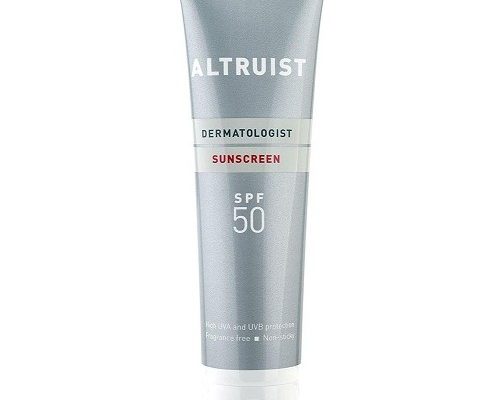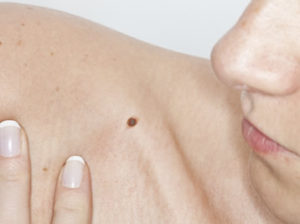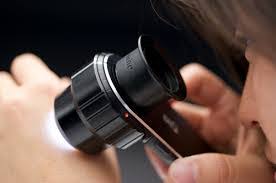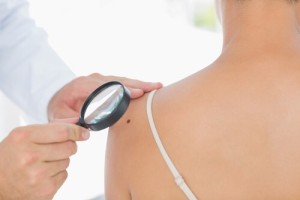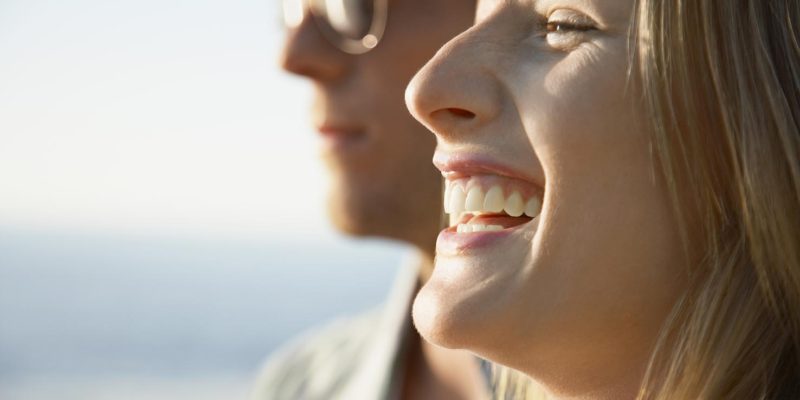Sunscreen – Who needs it?
Sunscreen – Who needs it?
The simple answer is everyone. Sunscreen protects against the harmful UVA and UVB rays which can cause skin cancer and skin ageing. The fairer your skin the more essential sunscreen becomes. The risk of skin cancer is greater in those with lighter skin types, though Asian and African skins can prevent much of the changes associated with ageing (wrinkles, uneven skin tone and pigmentation) by using sunscreen year round whilst reducing further their already small risk of skin cancer.
Which Sunscreen Should I Use?
The BAD (British Association of Dermatologists) recommends that you should use a sunscreen that provides broad spectrum protection (against UVA and B). SPF (Sun Protection Factor) refers to UVB protection and the BAD advises using SPF 30 or above. UVA protection is indicated by either an EU standard mark (UVA in a circle) or the Boots star system – 4 or 5 stars indicates very good protection.
Water resistance is a useful addition if you are likely to be sweating as it will not run and important if you are swimming. However, it is essential to reapply after swimming or towelling as it will have washed/rubbed off. There are many types of sunscreen in different formulations. Ultimately, you should use one that you feel comfortable applying generously – both from a cosmetic perspective and financial.
When Should I Use Sunscreen?
Whenever you will be outdoors in daylight for more than about 15 minutes, but also be aware that UVA (which is the main cause of ageing) can penetrate through glass, so you will still be exposed sitting in a car. Ideally, year-round as the UVA levels are fairly consistent year round and even when there is cloud cover. UVB causes burning and these levels increase with the intensity of the sun.
How Much Sunscreen Should I Use?
Probably more than you are at the moment! Most people do not use enough to achieve the quoted SPF. Some people suggest a shot glass worth, or a teaspoon per body part such as arms, legs, face and each side of the body, but I find these difficult concepts in practice, so I usually advise people to put enough on so that the skin looks completely white before the cream goes in.
It should be applied about 20 minutes before going out and then every two hours, or after swimming or toweling.
What is Altruist Dermatologist Sunscreen?
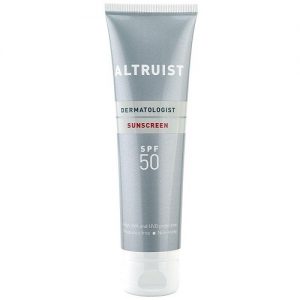
ALTRUIST: A sunscreen recommended by dermatologists
Developed by Dr Andrew Birnie in partnership with some of the best formulation scientists in Europe. Altruist has a broad range of photostable UV filters, including the most advanced filter Tinosorb A2B. Fabulous cosmetic feel – easily absorbed, non-sticky and no residue. Hypoallergenic and fragrance free.
According to Sue Ibrahim, our Nurse Consultant in Dermatology, cost should not be a barrier to regular use of sunscreen. Altruist is able to offer sunscreen at an affordable price, because of reduced profit margins and unnecessary marketing costs. ‘It is our mission to reduce the incidence of skin cancer through the increased use of quality sunscreen together with better education and awareness. This sunscreen has been formulated to be acceptable to all skin types. Moreover, Altruist donates to charities supporting children with albinism’.
Altruist Sunscreen SPF50 100ml only costs £4 from Elan Medical Skin Clinic in Essex
- Broad spectrum UVA and UVB protection
- Exceeds EU recommendations for UVA protection
- Clinically tested
- Easily absorbed, non-sticky and no residue
- Daily use on face and body
- Excellent tolerability
- Fragrance and paraben free
- Water resistant
Click here to purchase this product now.
Altruist Sunscreen SPF30 200ml only costs £4 from Elan Medical Skin Clinic in Essex
- Broad spectrum UVA and UVB protection
- SPF 30 and exceeds EU recommendations for UVA protection
- Clinically tested
- Fabulous cosmetic feel – easily absorbed, non-sticky and no residue
- Suitable for daily use on the face and body
- Excellent tolerability
- Hypoallergenic formulation
- Fragrance and paraben free
- Water resistant
Click here to purchase this product now.
1. UV protection:
A broad rang of photostable and photostabilised UV filters, including the most advanced filter available Tinosorb A2B, to ensure that quality protection is provided across the whole UVA/UVB spectrum. All of these are formulated at moderate concentrations in order to avoid any adverse reaction. This results in high quality UVA and UVB protection, exceeding EU standards.
2. Moisturising
To keep sufficient moisture in the skin glycerine (3%) and panthenol (0.3%) are formulated into the water phase at moderate concentration, to maintain hydration without exaggerating the moisturising effect associated with excessive glycerine.
3. Emulsion
The emulsion is formulated to optimise the distribution of sun filters on the skin, resulting in high SPF levels.
4. Preservatives
Molecules with known allergic potential like parabens, CMIT, MIT, bronopol, benzyl alcohol, IPBC etc. are avoided. Therefore a mixture of phenoxyethanol (0.3 %), silver choride (20 ppm), piroctone olamine (0.1 %) supported by caprylyl glycol was selected. This combination is especially designed to avoid the odour of many preservatives and to minimise any risk of skin sensitisation or allergy
Under The Same Sun Charity
Altruist and Elan Medical Skin Clinic supports Under The Same Sun, a charity supporting children with albinism in Tanzania and the rest of Africa. We believe everybody should have an equal opportunity to be protected from the sun. With each purchase we will donate 10p. By buying Altruist, you can help albino children in Africa!
Why is having albinism such an issue?
In Tanzania, an many parts of Africa, having albinism is a sentence to a harsh life and early death.
Albinism is a genetic condition, more prevalent in Africa. It results in a person looking white due to a lack of pigmentation in the hair, skin and eyes. People with albinism are visually impaired and highly vulnerable to sun exposure resulting in high rates of skin cancer.
Societal ignorance about the condition, as well as long-standing beliefs associated with witchcraft, lead to the dehumanization of people with albinism. It is widely believed that the body parts of people with albinism, used by witch doctors in magical charms and potions, bring wealth, health and good luck. This leads to brutal attacks resulting in maiming, death and the black market trafficking of albino body parts.Since 2006, more than 300 attacks have been recorded in 25 countries, and likely many more have gone unrecorded.
Under The Same Sun supports people with albinism in Tanzania with hats, locally made sunscreen, education and involves in the local community.

